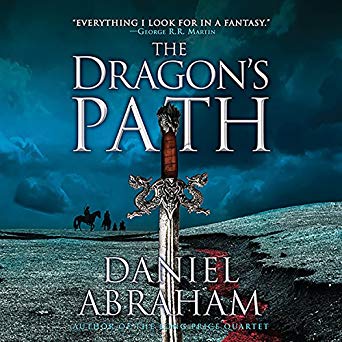Amy Goldschlager Reviews The Dragon’s Path and The King’s Blood Audiobooks by Daniel Abraham
 The Dragon’s Path, Daniel Abraham; Pete Bradbury, narrator (Hachette Audio 9781549118821, $24.98, digital download, 14.75 hr., unabridged) June 2018.
The Dragon’s Path, Daniel Abraham; Pete Bradbury, narrator (Hachette Audio 9781549118821, $24.98, digital download, 14.75 hr., unabridged) June 2018.
The King’s Blood, Daniel Abraham; Pete Bradbury, narrator (Hachette Audio 9781549118838, $24.98, digital download, 14.75 hr., unabridged) June 2018.
When The Dragon’s Path, book one of The Dagger and the Coin, first came out in 2011, I searched for an audio version of the book so that I’d be able to cover the book here and tell readers how awesome it is. I never found it, but apparently I didn’t search hard enough: Recorded Books produced audio versions of all five in the series. But the world of publishing has given me (and you) a second chance: the audio rights reverted, and now Hachette Audio is re-recording the books with the same narrator, beginning with the first two books in the series (The Dragon’s Path and The King’s Blood) this past June.
Once, the dragons ruled the world; now, they are no more, and the 13 human races (genetically engineered by the dragons to serve them) have dominion. That sets the stage for the rise of an often sympathetic but also infuriatingly insecure and weak-willed tyrant, Geder Palliako, a socially awkward minor nobleman who would prefer to read speculative essays rather than serve in the Antean army. The brutal politicking of more astute noblemen who intend to use Geder as a pawn backfires spectacularly, somewhat due to his being in the right place at the right time, and more heavily due to his following the clues in those speculative essays to find a reclusive and dangerous religious order with a plan to conquer the world. Other major characters include Cithrin bel Sarcour, a teenaged ward of a major bank, who takes the wealth out of the doomed city of Vanai and uses it to start her own branch elsewhere; Marcus Wester, a former general turned mercenary who becomes Cithrin’s protector; Dawson Kalliam, one of the aforementioned noblemen who eventually regrets propping up Geder; and Kit, leader of a band of traveling players and an apostate of the religious cult.
My initial love for the series began with Cithrin; many epic fantasies rely heavily on military might and/or political intrigue, without a care for the infrastructure necessary to support those endeavors. Cithrin and her bank are evidence of really thoughtful worldbuilding; it’s the same sort of thing that Seth Dickinson does so well with Baru Cormorant, the vengeful accountant/treasurer, and Max Gladstone with his firm of magical lawyers in the Craft Sequence.
I also admire the crafting of Geder, because he’s the kind of character that all nerds who engage in wish fulfillment need to see. Just because someone likes books and is bullied, that does not mean that he would be a good leader; and while we all have vengeance fantasies against the bullies, it’s maybe not a good idea to make those fantasies come true. Geder is bad with people; the only thing he knows how to do when they oppose him is kill them. We will see in these two books and going forward why this strategy is not a good one.
I’m several paragraphs in and I haven’t even mentioned narrator Pete Bradbury, which is unfair to him. I absolutely understand why Hachette Audio decided to retain him. He vanishes utterly into the text, taking direction from it beautifully (if the copy says a character raises his voice, he does; I know that seems obvious, but you’d be surprised how often a narrator won’t do that), and acting each character convincingly, both male and female.
I have always meant to get back to this series, and I’m glad to have had the opportunity to do so (I couldn’t wait for the rest of the audio rereleases, so I’m already reading my way through book five). Those readers and listeners who only know Daniel Abraham as one of the team that writes the blockbuster The Expanse series owe it to themselves to introduce themselves to Abraham’s intelligent and emotionally nuanced fantasy, both in this series, and his earlier one, The Long Price Quartet.
This review and more like it in the October 2018 issue of Locus.
 While you are here, please take a moment to support Locus with a one-time or recurring donation. We rely on reader donations to keep the magazine and site going, and would like to keep the site paywall free, but WE NEED YOUR FINANCIAL SUPPORT to continue quality coverage of the science fiction and fantasy field.
While you are here, please take a moment to support Locus with a one-time or recurring donation. We rely on reader donations to keep the magazine and site going, and would like to keep the site paywall free, but WE NEED YOUR FINANCIAL SUPPORT to continue quality coverage of the science fiction and fantasy field.








